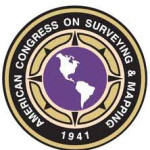- Industry: Earth science
- Number of terms: 93452
- Number of blossaries: 0
- Company Profile:
Founded in 1941, the American Congress on Surveying and Mapping (ACSM) is an international association representing the interests of professionals in surveying, mapping and communicating spatial data relating to the Earth's surface. Today, ACSM's members include more than 7,000 surveyors, ...
A plotting instrument for plotting from oblique photographs.
Industry:Earth science
Either of the two points in which the orbit of a satellite intersects the equatorial plane of the satellite's primary.
Industry:Earth science
A factor whose value depends on the longitude of the node of the Moon's orbit and which, when applied to the average value of the coefficient of a tidal constituent, will make that term applicable to the prediction of tides for a particular year.
Industry:Earth science
A map showing lines along which magnetic declination was constant on a particular date. Lines of equal annual change in declination are generally shown also. The date for which the map is valid must be shown on the map. If the map is intended for use in navigation, it is termed an isogonic chart.
Industry:Earth science
One of two measurements made as a pair to reduce the size of some systematic error in the individual measurements. In particular, one or a pair of measurements taken forward and backward at the ends of a line. For example, in trigonometric leveling, the angle measured from the horizontal plane of the observer to the top of some feature is usually paired with the angle (the reciprocal observation) measured from the horizontal plane at the top of the feature to the point from which the first angle was measured. The term should be applied only to measurements made simultaneously or within a short time of each other, because only then will conditions be such as to allow systematic errors to cancel each other.
Industry:Earth science
A device used, in combination with a pocket-sized stereoscope, for making horizontal and vertical measurements on the stereoscopic model.
Industry:Earth science
Photography done using radiation in the 0.1 to 1.5 μ part of the spectrum.
Industry:Earth science
A pocket-sized instrument registering the distance in linear units traversed by the pedestrian carrying it. The term was formerly applied to an instrument registering the number of steps or paces taken, but to which the term passometer is now applied. The pedometer, like the passometer, is housed in a case resembling that of a watch and is carried in an upright position attached to the body or to a leg. It registers the linear distance traveled in kilometers or other units. The number of steps or paces is transformed mechanically into linear units. This transformation depends on the length of the step or pace, and this may be different for different persons. The pedometer can be adjusted to the length of step of the person carrying it.
Industry:Earth science
A sample of a new map, made for inspection before printing all the required maps, to disclose errors or problems which may occur in compilation, drafting and reproduction.
Industry:Earth science
A printing process in which the design, instead of being transferred directly from the plate carrying the design to the paper, is transferred first to the surface of a rotating, rubber cylinder and then to the paper.
Industry:Earth science
